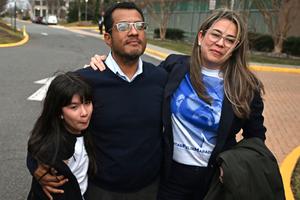US Bishops Warn Federal ‘Fairness for All’ Bill Takes the Wrong Approach
The bill’s sponsors say the legislation, introduced last month to Congress, is an effort to find ‘common ground’ between ‘LGBT’ issues and religious liberty.

WASHINGTON — Rep. Chris Stewart, R-Utah, and a small group of other Republicans introduced the “Fairness for All Act” (FFA) last month in an attempt to add “sexual orientation and gender identity” as a protected class similar to race or religion in Title VII of the 1964 Civil Rights Act, but also include religious exemptions for individuals and institutions such as adoption agencies, churches and Christian schools.
The measure comes shortly following the House passage of the “Equality Act” — a measure that would ban discrimination on the basis of “sexual orientation and gender identity” with no such religious exemptions.
The bill’s proponents say the bill is an effort to balance protections both for “gender” issues and for religious liberty, but the U.S. bishops are not supportive of its approach.
The U.S. Conference of Catholic Bishops (USCCB) wrote that while those behind the Fairness for All Act mean well, their approach is misguided and “effectively establishes ‘gender’ ideologies as a basis for federal laws, relegating fundamental truths about biology and marriage to often narrowly-prescribed exemptions.”
Additionally, the bishops pointed out that the legislation had little to no exemptions for charitable programs like women’s shelters, which would be opened to the opposite biological sex based on “gender identity” if they use federal funds. The bill also would subject religiously affiliated schools to “a government assessment of whether they are ‘substantially religious’ or controlled by a religion and whether their practices are ‘religious standards’ enforced with ‘reasonable consistency.’”
The bishops concluded, “even if FFA were sufficient to avoid creating these and other challenges, the ends (securing the included religious-freedom protections) do not justify the means (establishing gender ideology as a basis for a national policy, further undermining the anthropological basis of the family).”
They were not the only ones who had concerns about the approach of adding a protected class for sexual orientation and gender identity into federal law and including religious exemptions.
A number of organizations across the political divide have come out against the bill.
Organizations including Heritage Action for America and the Alliance Defending Freedom (ADF) wrote to Congress in November arguing that the Fairness for All Act “shares many of the dangerous characteristics of the Equality Act.” They argued that “by elevating sexual orientation and gender identity (SOGI) to the level of protected classes in the 1964 Civil Rights Act (CRA), this bill would codify a radical gender ideology and empower the federal government to punish citizens who believe sex is rooted in biology and that marriage is between a man and a woman.”
The American Civil Liberties Union (ACLU) and the Human Rights Campaign (HRC) have also come out against the bill due to their opposition to its religious exemptions. They claim it “would introduce new, problematic provisions purportedly seeking to prohibit discrimination based on sex, sexual orientation and gender identity with broad exemptions, essentially licensing discrimination against LGBTQ people and women.”
Looking for ‘Common Ground’
Tim Schultz, president of the First Amendment Partnership, which supports the Fairness for All Act, told the Register that the idea for the measure came from both “LGBT” activists and religiously conservative groups having “a sense that we share a common ground about what the law ought to protect.”
“It ought to protect people from being fired for something that’s very important to them,” Schultz explained. “It ought to protect people with religious beliefs and practices and institutions that are formed around those beliefs from facing the penalty of the law either, but nobody is accepting everybody’s overall view.”
As to secular objectors, like a non-religious doctor who doesn’t want to prescribe puberty-blocking drugs or a non-religious female athlete who doesn’t want to share a locker room or compete with a biological male, Schultz said that the bill “doesn’t create liability for people in secular situations like that. ... We’re not protecting them per se, but we’re not creating anything in the law that would create legal liability for them.”
In response to the specific case of the doctor who objects to puberty-blocking drugs, Schultz said that “most medicine in the gender identity/gender dysphoria context is being practiced by specialists,” and “people who have moral objections to it are just not going into that kind of medicine.”
But in their letter, the U.S. bishops pointed out that doctors and other health-care providers “would be forced to perform procedures for ‘gender transitions’ if they perform the same for other indications (e.g., hysterectomies for cancer patients), even if it is against their conscience or faith generally, or against their professional judgment as to the well-being of a particular patient.”
Schultz also said that the Fairness for All Act specifically does not address Title IX issues with transgender athletes and is not amending Title IX because they believe “this issue is going to be worked out by athletic commissions and states at the level of the NCAA” and that, “as the science becomes firmer, people will arrive at some reasonable conclusions that will probably differ by sport.”
However, the bishops said in their letter, “leaving Title IX of the Education Amendments in place is immaterial, as FFA’s amendments to Title VI of the Civil Rights Act would subsume it.”
‘Mitigation’ of Obergefell
When asked about the USCCB’s letter against Fairness for All stating that “gender ideology as a basis for a national policy” undermines “the anthropological basis of the family,” Schultz emphasized that he deeply respects the USCCB, both the bishops and staff, but said it was hard for him to respond to what he termed a “theological objection.”
“It really is the objection that putting into law a concept that violates the Catholic understanding of the human person is just something that Catholic bishops cannot support,” he argued.
“Religious leaders who are skeptical of Fairness for All, they will say, ‘Unjust discrimination of LGBT people is wrong and we condemn it,’ but they don’t think it ought to be put into law because it has all these other problematic implications and permutations,” Schultz said. “I really would say to them very respectfully, ‘Are people really hearing you when you say you oppose unjust discrimination if you oppose every single possible effort to make that unjust discrimination illegal?’”
Comparing the issue to the abortion issue, Schultz stated that there was “after Roe the view that nothing short of a total ban on abortion would be morally acceptably because to do anything otherwise was to cooperate with what was seen as a very unjust system,” but that’s “not held by anybody because of the practical experience of really having that fail and having people have an increased understanding of the idea of mitigation.”
“From the perspective of the social conservatives that support this, this is an incrementalist approach that is based upon the idea of mitigation and about the common good in a pluralistic society,” he emphasized.
A ‘Faulty’ Compromise
Ryan Anderson, an author and senior research fellow at the Heritage Foundation, disagreed with Schultz’s perspective and told the Register that the Fairness for All Act was put forward as “a compromise between what they call ‘LGBT rights’ and then religious liberty.”
This approach, he said, is “a faulty way of thinking of what’s at stake in this legislative area,” because “there’s a lot more at play than just religious liberty,” and “it’s unclear exactly what LGBT rights are.”
“People who identify as LGBT have human rights, but there shouldn’t be special rights based upon your sexual orientation and gender identity,” Anderson said. “When you elevate sexual orientation and gender identity to a protected class, which is what Fairness for All and the Equality Act would do, you don’t just create problems for religious liberty, you create problems for privacy, for safety, for equality, for other forms of liberty.”
“You don’t need to exercise religious liberty to think it’s a bad idea as a doctor to prescribe puberty-blocking drugs or cross-sex hormones or perform reassignment surgery,” Anderson emphasized. “You could be a secular girl and have all of the same privacy concerns about having a boy in your locker room, a boy that identifies as a girl.
“There are all sorts of concrete, legislative harms that this would introduce into federal law under the guise of civil-rights legislation.”
Anderson explained that part of the problem was “a fundamental disagreement” about what constitutes discrimination.
“One side of the debate wants to say, ‘If you believe that we’re created male and female and that male and female are created for each other that just is discrimination and so the law should treat you the same way the law treats racists and other people who engage in unjust discrimination,’” he said.
“That’s one side of the debate. The other side of the debate, my side of the debate, says, ‘No, that’s just anthropologically, metaphysically and morally true,’” he continued. “The simple truth of the matter is that we’re male and female and that male and female are created for each other, and, therefore, it can’t be discriminatory to act on the basis of those convictions.”
A better compromise than the Fairness for All Act, Anderson posited, would be to ask “how can we say unjust forms of discrimination should be prohibited, but believing that marriage unites husband and wife isn’t an unjust form of discrimination?”
“That’s where the hard work of legislation need to take place, and that’s not what the Fairness for All people have done,” he argued, adding the caveat that he believed those behind the measure were “well-intentioned.”
“I just don’t think those exemptions are going to hold up, once you concede the premise that our beliefs are discriminatory,” Anderson said.
“If the reality of the matter is that we’re created male and female and that men and women are created for each other,” he added, “then living that out in public life, whether it’s employment or housing or public accommodation or education or wherever, that can’t be discriminatory. And if the law says it’s discriminatory, then your law has gone off the rails from the very beginning.”
Lauretta Brown is the Register’s Washington-based staff writer.
- Keywords:
- fairness for all act
- lauretta brown

















